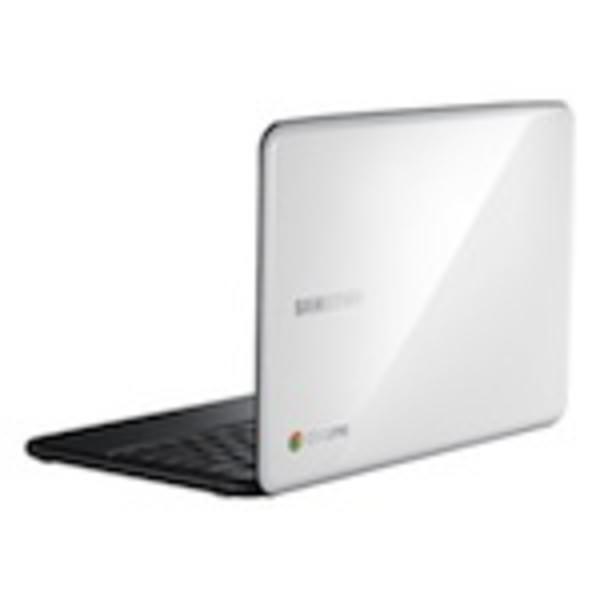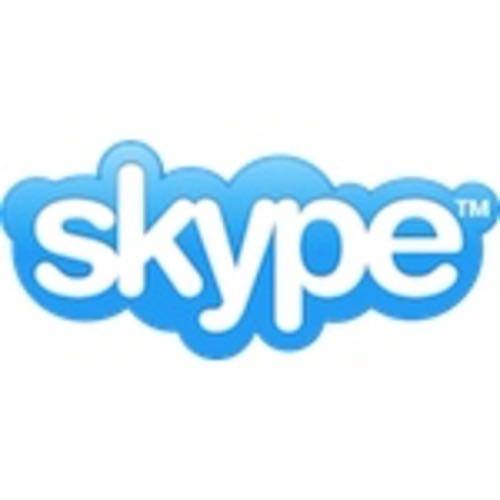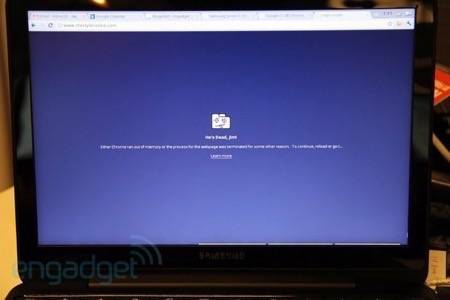I’ve had a chance to test-drive a Chromebook already, but having received my very own this week (See disclosure at the end of this post), I decided to see if, indeed, I could make the Web-only netbook work for me. I mean really work for me. Many of the early reviews of the Chromebook suggested that, while it was a great idea and a decent netbook, the Web itself wasn’t quite ready for users to have to rely solely on Web apps.

So I decided to put away my laptop (a MacBook Pro, for those keeping score at home) and try to go a full day without any native apps. I ran my new Chromebook through the paces, and although it’s a Friday, true – a day when a lot less tech news and tech blogging tends to happen – I was still able to perform my job, with little more struggling than if I’d moved to any new computer (or upgraded to a brand new operating system).
And that’s really what I found to be the major stumbling point throughout my day: simply switching to a new OS. It took me a while to retrain my fingers to the location of the CTRL key on the Chromebook – located in a different place than the Apple Command key. Having tweaked my Mac’s touchpad to suit my preferences, I had to do the same to the Chromebook – as much as possible at least – and re-learn the scrolling and drag-and-drop mechanisms. (I prefer to tap rather than click the trackpad, for example, and it took me a few to realize I had the option to do just that on the Chromebook.)
But a caveat here before I sing the praises of my Friday on a Chromebook too vociferously: I have moved much of my world into the cloud, and the Google cloud at that. I already rely on Google apps: I use Google Docs, Google Calendar, Google Reader, and of course Gmail in lieu of native app alternatives to writing, scheduling, RSS-ing, and email.
Replacing Native Apps
There are, however, some native apps upon which other aspects of my work world depend. Thanks to the suggestion of Wired’s YoruFukurou as my Mac Twitter client. I use Things as my To Do list manager, as I can sync my tasks across Mac and iOS. I use the native app version of Evernote. I use Text Expander to save keystrokes for the phrases I type over and over again throughout my day. Starting just last week, I’ve given Spotify a whirl; before that, iTunes was my music player of choice. And finally, there’s Skype, the tool that the ReadWriteWeb team uses for both chat and voice messaging.
And it was a replacement for Skype that had me scrambling first thing this morning. We have an editorial meeting every morning – voice, not video – and I had to take the Skype call on my iPhone. Strike 1 against the Chromebook, perhaps, but not an insurmountable problem. There are other Web-based VOIP alternatives, least of which being the new Google Plus Hangouts. And for the rest of the day, I found myself using imo.im, a Web-based tool where I could still monitor Skype chat.

To replace the my native app Twitter client, I utilized the Tweetdeck Chrome app. To replace the native Evernote app, I used its Web version. I installed the Aviary Chrome apps to handle screenshots and photo-editing. I could have used Google Music, I suppose, to play songs, but I ended up using the Spotify app on my iPhone instead (cheating, yes). Likewise I updated my To Do list on Things by utilizing the iPhone app.
And that’s one of the major discoveries I think from my day: although there have been a lot of complaints about the state of Web apps not being quite “ready for primetime,” many of us now carry two computing devices with us: one laptop-like machine and one smartphone. What my Web-based Chromebook couldn’t do, my iPhone could. That could be an indictment of the Web, I suppose, or an admonishment for those who’ve neglected building Web apps in exchange for focusing on native ones. Or it could be a recognition that our productivity today now relies on a lot more than simply one device. And in a lot of ways, that’s an argument for the cloud and for the Web. Store your information there. Access it anywhere, no matter if you’re using a smartphone, a native app, or a dumb terminal.
What I Like About Chrome OS
There were things about the Chrome OS that I found really surprising and actually quite pleasing. I love the way notifications work, for example. As a Mac user, I’ve become quite reliant on Growl to give me the pop-up messages when I have new mail, new Skype messages, and the like. Notifications in Chrome OS work similarly, and I was able to configure my Gmail, my Skype messages, the Tweetdeck Web app, and Google Chat to give me the notifications I needed. Even better, that Google Chat app stayed open across all tabs, so that I didn’t have to locate the tab in which I’d originally started the conversation.
I was also surprised with the ease with which I could handle file downloads. As a tech blogger, I was worried about capturing, saving, and editing images. Every blog post requires some sort of image, after all, and these inevitably have to be cropped and resized. (And yeah, I need practice with Aviary for sure.) But you can still save files to the Chromebook (and Google makes it easy to transfer these to Picasa, no big surprise), and one of the things I assumed would be the biggest hassle was only a slight hassle.

What Irked Me About Chrome OS
But there were hassles, don’t get me wrong. I had a fairly high incidence of crashing browser tabs. Of course, as a Mac user, I’m pretty accustomed to my Chrome browser crashing. But it occurred with a fairly high frequency today, forcing me to scour for a Task Manager (Chrome does have one) and to assess what was actually eating all my memory. Lo and behold, it was Google Plus. I blame the animated kitty GIFs.

I also never found a replacement for Text Expander, and I hope some dear ReadWriteWeb reader has a suggestion to help me there. I type ” < a href= ” a lot during my day. Anything that can save me from those keystrokes would be awesome. I also struggled to capture screenshots with Aviary, particularly of the multitude of crashed Chrome tabs.
Admittedly, I’m pretty hard on a computer – I work online after all. And at the end of the day, despite a lot of reservations, I think the Chromebook is very much doable for most folks. It’s not a stellar experience, not yet at least. It takes a lot of patience, but for really, that’s not a surprise when it comes to tackling a new machine and a new OS. And at the end of the day, a lot of the struggles I had aren’t necessarily the fault of the Samsung hardware or of the Chrome operating system.
It’s the reluctance on the part of folks to try something new. And yes, all of you who are still using Internet Explorer 6, I’m looking at you. How many folks have the patience to try something new? Or, as we’ve been accustomed to with tech companies that promise things “just work,” do we expect a seamless out-of-the-box experience?
The drawbacks to Chrome OS, of course, are also the fact that a lot of effort has been put into making shiny native apps, to the detriment of Web app development. With HTML5, I think we can do most things in a browser now. There wasn’t anything today I wasn’t able to do, even if I had to search for an alternative to the app I was accustomed to using. (The one exception: watching Netflix. But that’s why I have my iPad. I’ve already refused to install SIlverlight on my Mac to enable viewing there.)
Disclosure: I received a Samsung Chromebook having been an attendee at Google I/O. Chromebook error message image via Engadget.










